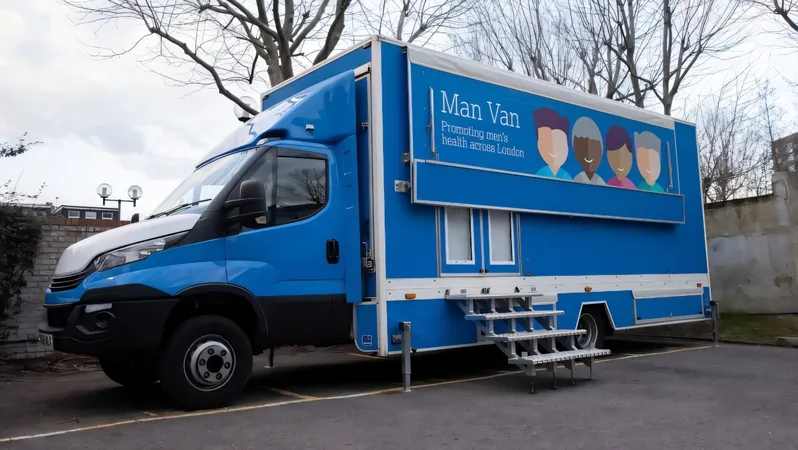
Revolutionary 'Man Van' Provides Early Prostate Cancer Detection for At-Risk Communities—Is This the Future of Healthcare?
2024-11-18
Author: Mei
A Groundbreaking Initiative
A groundbreaking initiative known as the "Man Van" is turning the tables on prostate cancer diagnosis, enabling earlier and more cost-effective detection among high-risk groups compared to traditional GP services, according to recent research unveiled at the London Global Cancer Week.
Effectiveness in High-Risk Areas
This mobile health clinic has proven exceptionally effective in areas with high deprivation and ethnic minority populations, revealing a staggering 86% of detected prostate cancers to be clinically significant—far superior to the 50% reported in similar studies. The implications are clear: by identifying clinically significant cases, fewer men are subjected to unnecessary diagnostic procedures and treatments.
A Focus on the Most At-Risk
Developed collaboratively by The Institute of Cancer Research, London, The Royal Marsden NHS Foundation Trust, and the RM Partners, this innovative project aims to address alarming disparities in cancer diagnosis. Black men are particularly at risk, with double the likelihood of developing prostate cancer and a higher chance of late diagnosis when treatments become more complex.
Strategic Deployment
Strategically deployed in seven diverse locations across London—including community centers, sports facilities, and local health services—the Man Van mobilizes community support to encourage participation and ensures timely referrals to local hospitals.
Incredible Results in Just One Year
Over the span of a year, more than 3,000 men have benefited from the initiative, with a marked representation of Black men accounting for 16% of those screened. Impressively, 22% of the total diagnoses were among Black men, showcasing the van's crucial role in addressing health inequalities.
Among the 94 identified prostate cancers, the data revealed that a staggering 81 (or 86%) warranted significant medical intervention. In comparison, traditional screening methods often miss critical detections, leading to unnecessary invasive procedures for many men.
The cost analysis suggests a substantial financial benefit as well, with the price for a PSA test at the Man Van being approximately 25% cheaper than through a GP—dropping from £68.41 to £51.11.
Beyond Prostate Cancer: A Holistic Health Approach
In an earlier pilot study involving over 600 men, the Man Van also revealed other pressing health issues, including undiagnosed diabetes in nearly 4% of participants. Surprisingly, additional health screenings uncovered one case of bladder cancer and another of esophageal cancer, underlining the van's comprehensive health initiative.
Plans for Expansion
The creators of the Man Van are looking to expand the model even further. As mobile health units that target liver or lung cancer emerge, researchers argue that a combination of education and preventative screenings could eradicate health disparities and facilitate access for vulnerable communities.
Experts Advocate for Broader Implementation
Clinical Research Fellow Dr. Masood Moghul asserts that the evidence gathered from the Man Van serves as a compelling argument for expanding mobile screening units to reach populations often diagnosed at a more advanced cancer stage. By collaborating with local stakeholders—such as charities and community leaders—the van not only raises awareness but also eliminates barriers to access.
Reflecting on the initiative's success, Professor Nick James, a leading Prostate Cancer researcher, emphasized the critical importance of detecting cancer early. The stark reality is that many men, especially those from diverse and deprived backgrounds, face elevated risks of late diagnosis, leading to poorer outcomes.
Conclusion
As the discussions around optimal prostate cancer screening continue, the results from the Man Van suggest that this mobile model is not just effective; it is essential. Will we see similar health initiatives rolled out nationwide? Only time will tell, but the implications for proactive healthcare delivery and equity are profound.

 Brasil (PT)
Brasil (PT)
 Canada (EN)
Canada (EN)
 Chile (ES)
Chile (ES)
 España (ES)
España (ES)
 France (FR)
France (FR)
 Hong Kong (EN)
Hong Kong (EN)
 Italia (IT)
Italia (IT)
 日本 (JA)
日本 (JA)
 Magyarország (HU)
Magyarország (HU)
 Norge (NO)
Norge (NO)
 Polska (PL)
Polska (PL)
 Schweiz (DE)
Schweiz (DE)
 Singapore (EN)
Singapore (EN)
 Sverige (SV)
Sverige (SV)
 Suomi (FI)
Suomi (FI)
 Türkiye (TR)
Türkiye (TR)